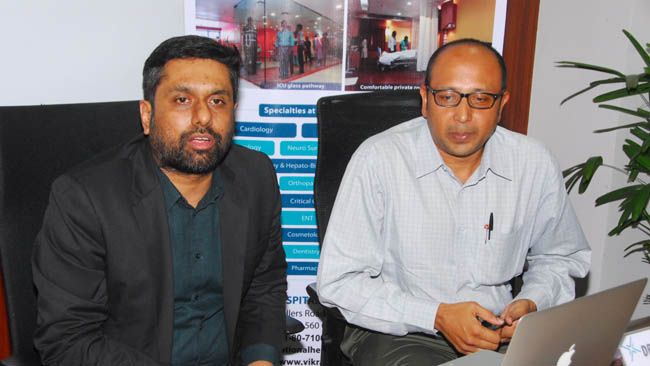
Hyderabad, November 20, 2019: Vikram Hospital Bengaluru, a multi-specialty hospital launched the state-of-the-art ‘Center of Excellence’ for Huntington Disease. The first of its kind center caters to all the patients across India and abroad who have been suffering from Huntington Disease, a rare genetic disorder that causes nerve cells in the brain to break down. The clinic offers patients, expert care and support from pre-diagnosis through late stages of the disease.
The Center of Excellence will feature a multidisciplinary approach to care that will aim to be a one stop shop for patients. Dr. Prashanth LK, Parkinson’s disease and Movement Disorders specialist is the lead for this specialized clinic for Huntington’s disease. The Huntington’s disease clinic in Vikram Hospital comprises of Movement Disorders Specialist, Psychiatrist, Nurse Practioners, Neuropsychologist, Physiotherapist and Nutritionist. The clinic will run on 4th Wednesday of every month with prior appointments.
Huntington disease stems from genetic factors which is typically inherited from their parents. Mutation within the gene coding for the Huntington protein affects a person’s normal functioning and may lead to complete dependency. While this disease is predominant in the Western countries, a lot of cases have been seen in India lately. Most of the patients belong to the age group of 40 to 60 years, and about 5 to 10 percent of cases are seen in the younger age group. On the whole, between 20,000 to 40,000 are suspected to be affected with Huntington disease in India and more than 0.2 million might be at risk of being affected. Dr. Prashanth pointed out that the number of Huntington’s disease patients seen in Indian specialist movement disorders clinic are on raise and they require more specialized attention and care.
“Huntington disease is a major concern today, as there is a concept of “Anticipation”, which means the next generation develops symptoms much earlier than the previous generations”, says Dr. Prashanth L. K, Consultant Movement Disorders Specialist, Vikram Hospital Bengaluru. “Some of the symptoms of this disease could be behavioral (like depression, anxiety, suicidal thoughts) or Movement disorders (like restlessness movements) or cognitive (like difficulty in organizing, loss of flexibility, impulsive, etc). As the disease progresses, symptoms become more obvious, including uncontrollable jerky movements and drastic personality changes and by later stages, they become completely dependent for all activities.” Dr. Anand Jayaraman, Consultant Psychiatrist, Vikram Hospital Bengaluru, tells that the behavioral symptoms many times predates the other symptoms leading to difficulties in their professional and family lives in early career.
The center is collaborating with various research labs and scholars across India and abroad to get best of the therapies to the Indian Huntington’s disease patients. The disease can be diagnosed through a blood test where specific genetic mutations are studied. It can be passed on from one generation to another. For instance, if a parent has the gene, each child has a 50/50 chance of inheriting it or escaping it. The Center of Excellence will have all the facility for tracking the disease and the severity of the same.
Addressing the briefing at Vikram Hospital Bengaluru, Dr Somesh Mittal, CEO & Managing Director, “Vikram Hospital is happy to announce to be the first multispecialty hospital in Bengaluru to come up with the special care facility on Huntington disease. The disease is challenging if not detected early adding significant pressure on the individuals as well as their families. Finding specialized care can be very difficult at times. Most patients currently travel outside India to find treatment. With this launch at our hospital, patients can now receive expert care they need all in one place.”
While there are no specific treatments that can decrease or stop the advancement of this disease, supportive care and medications can help patients manage the symptoms. Dr. Prashanth LK, informs that currently we may be at the cusp of possible disease modifying therapies as many recent new medication trials have shown very promising results.